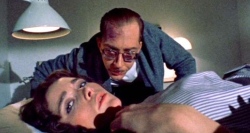
 Maybe I’ve seen too many gory horror flicks (guilty, your honor!), but Prime Evil director Roberta Findlay’s infamous Tenement didn’t quite strike me as the mega-disturbo flick it’s made out to be: “TOO VIOLENT TO BE RATED!” I mean, it’s no picnic in Central Park, but how could it mess up your mind when its jaunty hip-hop theme song reminds me of Mario Van Peebles in Beat Street?
Maybe I’ve seen too many gory horror flicks (guilty, your honor!), but Prime Evil director Roberta Findlay’s infamous Tenement didn’t quite strike me as the mega-disturbo flick it’s made out to be: “TOO VIOLENT TO BE RATED!” I mean, it’s no picnic in Central Park, but how could it mess up your mind when its jaunty hip-hop theme song reminds me of Mario Van Peebles in Beat Street?
On a hot August day in the Bronx, after threatening one of its own with a dead rat, a gang is removed forcibly from its home base(ment) in a two-bit apartment building, much to the rejoicing of the landlord and residents, who throw a party: “We won’t be seeing them again. Cheers!” They forgot to knock on wood, because elsewhere, high as a kite, gang leader Chaco (Enrique Sandino) vows, “I’m gonna get my building back! We’re gonna have some fun!” Watch out for their Wang Chung.
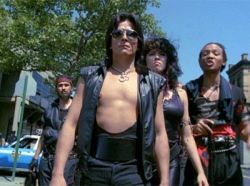 As night falls, the shit goes down. They assault the residents, taking a straight-razor to a neck or two. While getting raped, an African-American woman stabs her attacker in the eye with scissors. She’s rewarded with a pipe up the plumbing — implied, luckily. Our hooligans stop only to shoot up and, in Chaco’s case, knead the breasts of his gal pal with his bloody paws.
As night falls, the shit goes down. They assault the residents, taking a straight-razor to a neck or two. While getting raped, an African-American woman stabs her attacker in the eye with scissors. She’s rewarded with a pipe up the plumbing — implied, luckily. Our hooligans stop only to shoot up and, in Chaco’s case, knead the breasts of his gal pal with his bloody paws.
Eventually, the residents get all Howard Beale/Twister Sister on the scumbags, which gives the grimy film its cathartic kick. A granny delivers a baseball bat to the ‘nads; one tuffie is electrocuted via bed frame; and even the kids get in on the action, pouring pots of boiling water. Those aren’t spoilers so much as reasons for you to watch this relentlessly downbeat exercise in nihilism. —Rod Lott

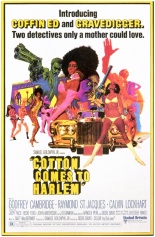
 Although often lumped in with the blaxploitation films of the period, Ossie Davis’
Although often lumped in with the blaxploitation films of the period, Ossie Davis’ 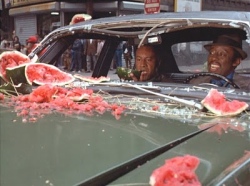

 Few movies will make you happier to be married than
Few movies will make you happier to be married than 
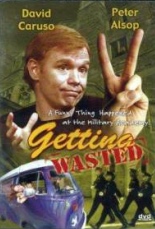
 Near-albino Brian Kerwin (clearly the Jeff Daniels of his day) has to join a military academy after getting expelled from high school. The year is 1967, where there’s a long-haired hitchhiker on every corner and cars have bumper stickers reading “GOD IS ALIVE … AND HE LIVES IN A SUGAR CUBE!”
Near-albino Brian Kerwin (clearly the Jeff Daniels of his day) has to join a military academy after getting expelled from high school. The year is 1967, where there’s a long-haired hitchhiker on every corner and cars have bumper stickers reading “GOD IS ALIVE … AND HE LIVES IN A SUGAR CUBE!” 
